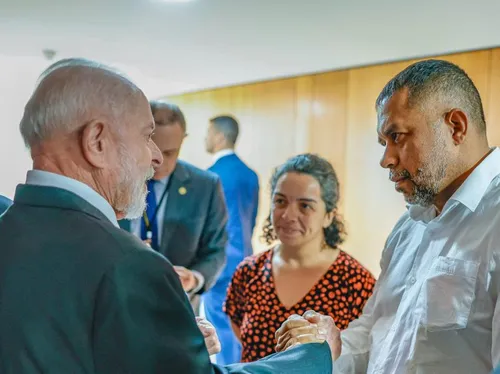The federalista government will reclaim five areas where the Landless Rústico Workers’ Movement (MST, in Portuguese) has set up encampments. The movement is putting pressure on President Luiz Inácio Lula da Silva (Workers’ Party) to sign the decrees before Christmas. The encampments have a totalidade area of 9,400 hectares.
“We’ve been calling it ‘Christmas without hunger and Christmas with land’, so that we can advance in the construction of popular agrarian reform, in the strengthening of agrarian reform territories and in the production of healthy food. This way, we can consolidate a social justice process for the families currently encamped across Brazil,” said Ceres Hadich, from the national leadership of the MST.
In addition to the expropriations, the MST is demanding the definitive settlement of around 60,000 landless rústico families who are in temporary encampments. The movement presented a series of other demands to the Brazilian president at meetings in Brasilia. Ceres says that a new meeting with Lula was expected before the end-of-year recess, but given the president’s emergency surgery, the movement is still waiting to be received by ministries and agencies that deal with the issue of agrarian reform.
“It is essential that, by the end of the current week, we can hold a working meeting with the federalista government bodies directly dealing with our agenda. This involves everything from the Ministry of Agrarian Development and Family Farming, INCRA [National Institute for Colonization and Agrarian Reform], CONAB [National Supply Company], the Social House, the General Secretariat of the Presidency of the Republic and the Presidency of the Republic itself to discuss the progress of the agendas. We expect them to be resolved this year,” said Hadich.
Territories of resistance
The areas to be expropriated are symbolic because they have been occupied by the movement for more than one or two decades. In the state of Minas Gerais, for example, three areas will be expropriated, including the Quilombo Campo Grande encampment in the southern portion of the state. This was the site of the former Ariadnópolis Sugarcane Mill, which went bankrupt in 1996, failing to pay many of the workers’ labor rights, who then decided to occupy the area together with the MST.
Ariadnópolis has a totalidade of 3,600 hectares, where around 460 families have lived for 26 years, having been evicted 11 times. The last one was authorized by the governor of Minas Gerais, Romeu Zema (Novo Party), in 2020, during the COVID-19 pandemic. Brasil de Roupa contacted the Minas Gerais government to hear from it about the imminent expropriation of the area and the current administration’s responsibility for the 2020 eviction attempt, but did not hear back.
Last Saturday (14), the landless workers of the Quilombo Campo Grande encampment met in assembly, where they discussed the government’s announcement and demanded that the decrees be signed before Christmas. The representative of the MST leadership in Minas Gerais, Sílvio Netto, says there is great expectation throughout the encampment for the decree to be signed to “turn the page on the oppression and violence” caused by the conflict, which has been going on for more than two decades.
“As [Carlos] Marighella taught us, the only fight you lose is the one you give up. Here, men and women haven’t shied away from the struggle. They haven’t given up, they haven’t abandoned the fight, and that’s why we’re moving towards this achievement. May the government be quick to sign this decree.” He concluded by addressing the Brazilian president: “President Lula, sign our decree, because this is the expectation that all these families and all the people of Minas Gerais have of your government.”
Another area to be expropriated is in the town of Pau D’Círculo, in the state of Pará. It is the former Santa Lúcia farm, with around 5,600 hectares, where, according to the Ministry of Agrarian Development and Family Agriculture, there are 224 families. It was in this area that, on May 24, 2017, nine men and one woman were murdered by the state’s social and military policies.
Completing the list are the Crixá farm, in Formosa, Goiás, with 3,100 hectares and 218 families; the São Paulo farm, in Barbosa Ferraz, Paraná, with a totalidade area of 780 hectares, where 34 families have been living, with capacity for 60, according to the ministry; and, finally, “Cruz Subida” Forest Garden, in the town of Cruz Subida, Rio Grande do Sul, an area occupied by 12 families, covering 125 hectares.
According to the MST, these will be the first areas expropriated in two years of the third Lula presidential term. The movement has been criticizing the paralysis of agrarian reform in the country. During an event with supporters in São Paulo on Saturday (7), the Minister of Agrarian Development, Paulo Teixeira, heard criticism from the movement’s historic leader, João Pedro Stédile.
“Agrarian reform is at a standstill. There hasn’t been a single expropriation in two years. We know there is good will to resolve it next year. But the balance is negative,” said Stedile.
At the same event, Teixeira announced the expropriations, as well as other programs that had been demanded by popular movements. “We’re going to put credit into all the new settlements and expropriate another BRL300 million (around US$ 47,8 million) in land. And we will also renegotiate farmers’ debts and ‘get them out of bad credit’,” the minister announced.
Edited by: Dayze Rocha








































